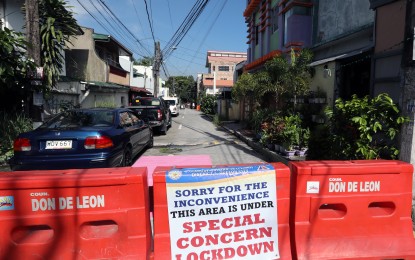
(File photo)
MANILA – The 19 local government units (LGUs) whose jurisdictions were included in the expanded pilot of the alert levels system (ALS) have been consulted, Malacañang said Thursday.
This, after the League of Provinces of the Philippines (LPP) urged the Inter-Agency Task Force for the Management of Emerging Infectious Diseases (IATF-EID) to defer the expansion of the pilot ALS to areas outside Metro Manila to Nov. 1.
Presidential Spokesperson Harry Roque, in a virtual presser, said the IATF-EID had informed the concerned local executives about the new alert levels in some provinces and cities.
“Lilinawin ko lang po ha. Lahat po ng mga rehiyon at mga probinsyang magpapatupad ng alert levels system, kinonsulta po ang mga LGU (I just want to clarify. All regional and provincial LGUs have been consulted over the implementation of the alert levels system),” Roque said.
The IATF-EID, in its Resolution 144-D issued on Oct. 18, approved the pilot of the ALS in 14 provinces and five cities from Oct. 20 to 31.
Under the resolution, Alert Level 4 has been implemented in Negros Oriental and Davao Occidental, while Alert Level 3 has been imposed in Cavite, Laguna, Rizal, Siquijor, Davao City, and Davao del Norte.
The provinces of Batangas, Quezon, Bohol, Cebu, Davao de Oro, Davao del Sur, and Davao Oriental have been put under Alert Level 2.
Alert Level 2 has also been implemented in the cities of Lucena City, Cebu, Lapu-Lapu, and Mandaue.
On Wednesday, LPP president and Marinduque Gov. Presbitero Velasco Jr. said LGUs need time to study the alert levels.
Roque said the IATF-EID need not inform all the local executives nationwide, since the expanded pilot of the ALS covers only select areas in the country.
“Hindi po siguro nakonsulta ang buong league of governors kasi hindi naman po i-implement sa lahat ng probinsya ang alert levels system (Perhaps, not all league of governments had been consulted because the alert levels system will not be implemented in all provinces),” he said.
Roque, nevertheless, said the alert levels will be implemented outside Metro Manila, since there was already a drop in coronavirus disease 2019 (Covid-19) infections and improvement of healthcare utilization rate in the country’s metropolis.
Citing Covid-19 data in Metro Manila, Roque said the lower Covid-19 cases in the region could be attributed to the ALS.
“‘Yung mga paunang datos po ay nagpapakita na mukhang gumagana po itong alert levels system, dahilan para i-expand natin yung pilot at malaman natin with conclusiveness kung talagang mas epektibo nga itong alert levels system and granular lockdown (The data showed that it seems working, a reason to expand the pilot implementation and determine with conclusiveness if alert levels system and granular lockdown are more effective),” he said.
Minors still generally not allowed outside
Given the recent IATF-EID resolution on the movement of minors, Roque said children below 18 years old are still generally not allowed to go out in Metro Manila.
Under current IATF guidelines, those belonging to the vulnerable population including the elderly, pregnant women, those with co-morbidities, and children below 18 years old shall be allowed access to obtain essential goods and services and work in permitted industries. They can likewise do individual outdoor exercises, regardless of vaccination status.
Other than those mentioned above, children are still not allowed to be out in public, especially in indoor areas because they are not yet vaccinated and are still susceptible to the virus, Roque said.
“Hindi naman po binago ang rule, kung kinakailangan dahil ito po ay necessity, para bumili ng gamot, para bumili ng pagkain, para magtrabaho ay hindi naman po sila pinagbabawalan (The rule was not changed, if needed because it is a necessity to buy medicine, food, and to work is not prohibited),” he said.
Metropolitan Manila Development Authority Chairperson Benjamin “Benhur” Abalos Jr. affirmed Roque’s statement, citing the relevant IATF-EID guideline on the matter.
Abalos said intrazonal and interzonal travel shall also be allowed subject to reasonable restrictions based on age and comorbidities as may be determined by the LGUs. (PNA)
